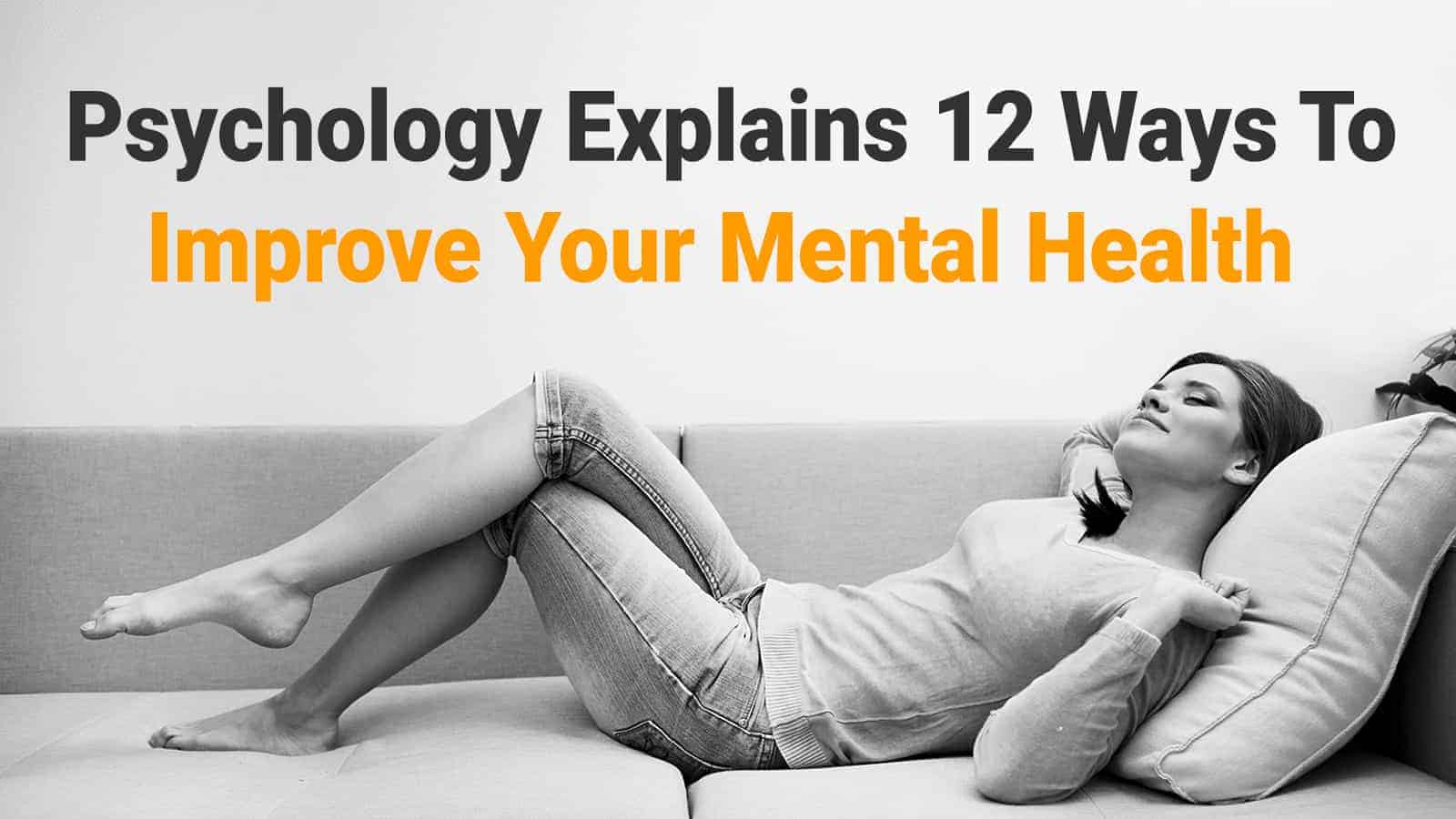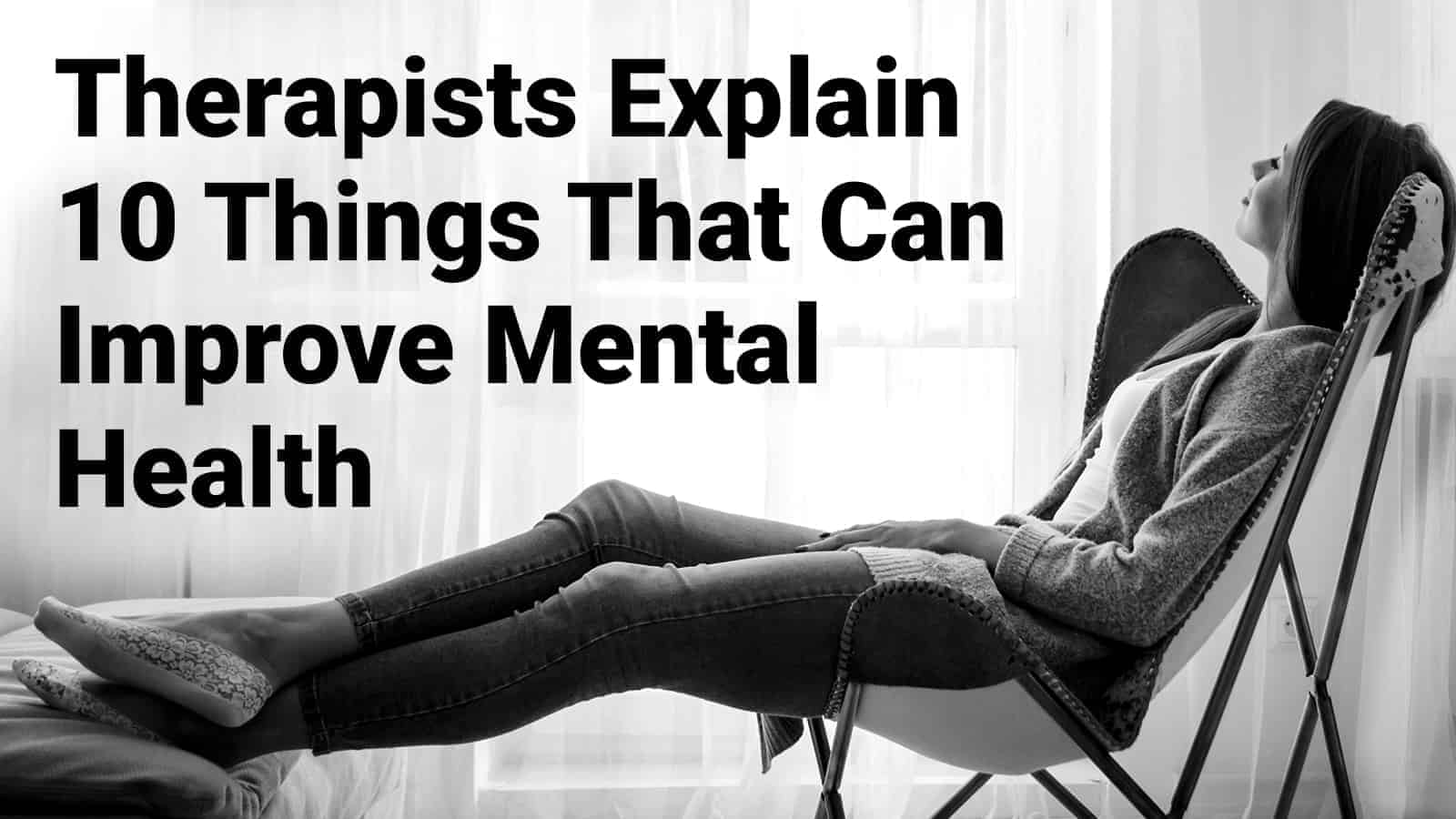Mental health is just like any other skill in life – you have to practice to get better. Many people make the mistake of only tending to their mental health when they have a major problem. While many of us don’t even realize something is wrong until we’re experiencing symptoms, plenty of us know that something is a bit “off” without actually knowing how to put it into words.
Everyone’s story is different, so the approach we take to our mental health will vary depending on our unique personalities and needs. These 12 ways to improve mental health are just the beginning, but we hope they’ll get you started on the right path toward a happier, healthier life.
12. Exercise
Working out is often recommended to anyone who’s struggling with their mental health; You might be tired of hearing that you should exercise. When you feel exhausted all the time and just want to lay around, working out doesn’t feel appealing in the slightest. But regular exercise has been scientifically proven to improve the symptoms of depression and anxiety (1).
Studies have shown that moderate amounts of exercise can be as effective as antidepressants (2). Exercise creates self-discipline and structure, two vital components you need to improve mental health.
11. Journal
Journaling is often used in therapy to help patients get in touch with their thoughts, feelings and fears. When you journal, you can confront everything jumbled in your head and slowly untangle the threads on paper. Sometimes, we can’t even put how we’re feeling into words. With journaling, all you have to do is write. You can use a journal to release stress and tension, explore your anxieties and even track your symptoms over time (3).
When you journal regularly, you’ll learn how to talk to yourself and pay greater attention to your feelings. Many of us go through the day trying to suppress our negative thoughts and emotions, but journaling is all about you.
You don’t have to follow any structure or prompts. If you find that journal prompts help you, that’s great, but you’re also more than free to just spend a few minutes writing whatever comes to mind on a page. Sometimes you might write lists, other days you may just want to write down some positive affirmations to lift your spirits.
Whatever you choose, journaling is one aspect of a healthy lifestyle that will help you understand your mind more.
10. Eat a Mood-Boosting Meal
In addition to following a healthy diet, you can instantly help your mental state by eating a meal packed with mind-nourishing nutrients. Carbs (in moderation) can increase the output of serotonin, the “happy hormone.” Protein helps make you more alert by stimulating the production of dopamine, norepinephrine and tyrosine (4).
An unhealthy diet has been found to be as great of a risk to your mind as it is to your body; people who eat poorly are at a greater risk of experiencing depression and anxiety. Emerging studies in the field of nutritional psychology suggest that improving one’s diet can help prevent the onset of a variety of mental disorders (5).
9. Go to Bed On Time
While insomnia is closely linked with anxiety and depression, it’s important that you try to maintain as normal of a sleep schedule as possible. Sleep deprivation only worsens the symptoms of mental illness, and you’ll experience additional physical setbacks that only make it more difficult to cope.
Turning off all screens an hour before bedtime and cutting off caffeine at least six hours before bed will help you sleep more soundly throughout the night. If you really struggle to fall asleep and nothing helps cure your insomnia, speak to your doctor. He or she may be able to prescribe melatonin supplements or other sleep aids that will help you get some rest.
8. Limit Alcohol Consumption
Mental illness can tempt a lot of people to rely on alcohol to alleviate their symptoms. People with anxiety, for example, might start drinking to feel more relaxed. Heavy drinking won’t make the negative feelings go away, and studies have linked alcohol abuse to depression disorders (6).
Instead of relying on alcohol or other substances to alleviate your discomfort, focus on adopting some new coping strategies. During periods of anxiety, breathing exercises can be immensely helpful. Depressive episodes can last for weeks or even months, but during this time, it’s important to focus on maintaining as much of an active lifestyle as you can and managing your symptoms in a healthy manner.
7. Meditate
Meditation has been proven to improve the symptoms of anxiety and depression in multiple studies. Meditation is intimidating for a lot of people; when you’re already consumed by your nagging thoughts, the last thing you want to do is set aside time to be alone with them. But meditation teaches us how to simply be present. Through meditation, we learn how to acknowledge and accept our we’re feeling without identifying with anything.
Meditation can help you take a step back from your mental illness by focusing on the present and realizing that underneath all the pain, struggles and worries, you’re still you.
6. Ask for Help
If you need to talk to someone, there are plenty of ways to get in touch with a mental health professional. Apps like Talkspace make therapy accessible and affordable. If you’re in need of immediate assistance, there are a few resources to keep on-hand:
The National Suicide Prevention Lifeline
Available 24-hours a day, you can call 1-800-273-8255 and speak to a licensed crisis counselor. You don’t even have to be contemplating suicide to get help; the Lifeline encourages anyone who is in emotional distress to reach out.
2. The Trevor Project
The Trevor Project is a suicide and crisis intervention organization for LGBTQ youth, but anyone is able to call their lifeline and get help; You can get connected to someone 24-hours day, seven days a week via phone. If you prefer to chat online or text, the hours are 3 p.m. to 10 p.m. EST.
5. Embrace Your Favorite Things
Snuggle up under a cozy blanket and watch your favorite movie; read a book that you’ve loved since childhood; play a video game that helps you unwind and get a break from your thoughts. Sometimes, we really just need to take a step back and allow ourselves to experience life outside our heads.
If you struggle with self-love, try imagining that you’re really taking care of a good friend. Give yourself yummy food, brew a hot cup of tea or coffee and speak kindly to yourself.
4. Practice Self-Acceptance
It’s easy to think we’re our problems. After all, mental health is so ingrained in every facet of our lives that it’s hard to differentiate ourselves from our symptoms. It’s important to remember that despite whatever struggles you have, you aren’t just a diagnosis.
Anyone who struggles with their mental health will tell you that there’s no shortage of ways their illness has influenced their lives; instead of thinking of yourself as flawed or damaged, learn to accept who you are beyond your symptoms.
Depression, anxiety, bipolar disorder and the myriad other mental illnesses people have aren’t personality traits. Even with all your struggles, you are still a valuable person with plenty to offer yourself and the world around you.
Learning to accept yourself will lead to a greater sense of self-confidence, inner peace and emotional resilience.
3. Educate Yourself on Mental Health
Mental Health America offers free online screenings for common mental illnesses such as depression, anxiety, bipolar disorder, PTSD and addiction. Start by clarifying your own symptoms to yourself. Read about the various ways our mental state affects our daily lives, and recognize the warnings signs as well as ways to get better.
In many cases, you’ll find that education helps strip the fear from mental illness. When you know that what you’re experiencing is something clinical, it can help you take a step back and approach it from a healthier perspective.
2. Take Responsibility for Your Problems
We can’t control what happens to us in life or even prevent every mental illness; but at the end of the day, no medication or therapist holds the magic solution to our problems. In order for therapy to be successful, be it self-therapy or sessions with a counselor, we have to show up and be present.
In order to improve mental health, we have to acknowledge and engage with it. We can’t assume that therapy or medication will automatically fix our issues. In order to get better, you have to understand what “better” looks like for you. By clearly defining our objectives, we are more capable of taking concrete steps toward recovery.
1. Remember to Praise Yourself for Trying
Every day won’t be a milestone, but your efforts always matter. Even when you can’t bring yourself to get out of bed, the fact you care and want to get better means something. Be kind to yourself, surround yourself with positive people and celebrate your achievements. Big or small, every step you take to improve mental health and live a better life deserves recognition.


















